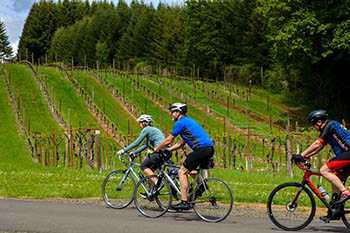Junction City, Oregon

The city of Junction City, Oregon was officially incorporated on October 29, 1872, and recently held its 150 year celebration. Junction City received its name in the 1800s based on plans for a future railroad junction that never manifested. In 1902, real estate developer, A.C. Nielsen, founded a Danish settlement in Junction City. He divided his 1,600-acre ranch into smaller parcels and advertised in a Danish newspaper circulating in Iowa. Many families with direct descent from Denmark arrived in Junction City to set up small diversified farms. A Lutheran Church was established which helped preserve the settlers' Danish culture. Church services were conducted in Danish up until 1951. Today, as much as twenty percent of Junction City's residents are believed to have Danish roots.
Junction City has been predominantly a farming community, and along with grains, vegetables and livestock, there are many vineyards now sprawling across the valley floor. As area wines, particularly Pinots, started garnering international attention in the 70s, vintners from California and Europe started speculating on property in the region. Some local farmers took note and converted their lands into vineyards. In 2021, the Lower Long Tom watershed in Junction City was officially recognized as the Lower Long Tom AVA with a dozen boutique wineries and many more vineyards. Wine tasting tourism is growing as visitors discover the beautiful countryside and award-winning wines are accompanied by farm-to-table foods, miles of quiet country roads for cycling and horseback riding, and pristine golf courses.
By the 1970s Junction City was home to the largest recreational vehicle industry in the nation. Country Coach, Monaco Coach Corporation and Marathon all opened divisions here, earning Junction City the moniker "The RV Manufacturing Capital of the World." RV dealerships thrived and businesses offering custom RV services and products from upholstery to electronics sprang up around the larger manufacturers.
RV enthusiasts still rally around Junction City for servicing, outfitting and upgrading - ensuring that Junction City will be a motorhome destination for many more years to come.
The annual Scandinavian Festival held today commemorates the region's strong Scandinavian heritage and also their fighting spirit. Bypassed once again in the 1960s with the construction of Interstate 5, Junction City struggled. Suddenly, motorists were whizzing by the community on the far side of Eugene - thus Junction City's hotels, restaurants and shops were left empty. In 1961, Dr. Gale Fletchall organized a community-wide four-day festival honoring the town's Danish ancestry. They hoped to draw 4,000 visitors to Junction City but instead 10,000 people showed up.
Attendance has continued to grow ever since. In 2014, the event was named an Oregon Heritage Tradition by the Oregon Heritage Commission. Today, as many as 100,000 people visit Junction City each August for the traditional dancing, crafts and food.